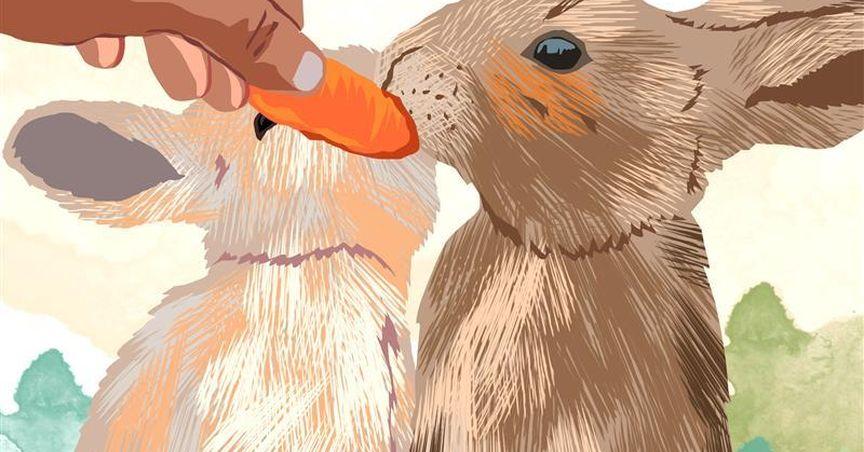Image source: © 2025 Krish Capital Pty.Ltd
Rabbit owners in the UK are always looking for the best ways to keep their bunnies happy and healthy. And great news: you don’t need to rush to the local pet shop to feed your rabbits additional foods and treats as well as their staple diet of hay!
Many foods you already have in your kitchen or garden are perfectly safe and nutritious for your small pets.
Here’s a rundown of 10 rabbit-safe foods you might have at home, along with tips on how to feed them safely and properly.
Why Choose Foods from Home?
Like most small domestic pets, you will need to feed plenty of quality rabbit hay, fresh greens, and a handful of rabbit-safe pellets, but adding variety with everyday household foods can keep mealtimes interesting too!
Using what’s in your fridge or cupboard is both budget-friendly and convenient. As with introducing any new human foods to your rabbit, always ensure they're pet-safe, introduce them gradually, and check with a vet if you’re unsure.
Top 10 Rabbit-Safe Foods
- Romaine Lettuce
Got a head of romaine lettuce in the fridge? It’s a fantastic choice for rabbits, packed with vitamins and low in sugar.
Offer a few leaves daily (about 1-2 handfuls for an average bunny). Avoid iceberg lettuce, as it’s mostly water and lacks nutrients.
- Parsley
This common herb, often left lurking in your kitchen, is a rabbit favourite.
Parsley is rich in nutrients but should be given in small amounts (a few sprigs) due to its calcium content. Perfect for adding variety to their greens.
- Carrots (in Moderation)
Carrots are a classic bunny treat, but they’re high in sugar, so use them sparingly. A few thin slices once or twice a week is plenty.
The leafy carrot tops, if you have them, are even better and can be fed more often.
- Apple (No Seeds)
An apple in your fruit bowl can double as a special rabbit treat. Remove the seeds and core, then offer a small slice (about a 1cm wedge) once a week.
Rabbits love the sweetness, but too much can upset their tummy.
- Celery
Celery stalks and leaves are crunchy and rabbit-safe, providing hydration and fibre. Chop them into small pieces to prevent stringy bits from causing issues.
A few small chunks work well daily as part of their veggie mix.
- Mint
If you’ve got mint growing in your garden or a pot on your windowsill, your rabbit will thank you.
Fresh mint leaves are safe and aromatic, great for digestion. Offer a few leaves a couple of times a week.
- Kale
Kale, a supermarket staple, is nutrient-dense and loved by many rabbits.
Feed it in moderation (a few leaves daily) because of its high calcium content. Mix it with other greens to balance their diet.
- Coriander
Another herb you might have for cooking, coriander (or cilantro) is safe for rabbits and adds a fresh flavour to their meals.
A small handful a few times a week is a great addition to their greens.
- Broccoli Leaves
If you’ve bought broccoli with the leaves still attached, don’t toss them! Rabbits can eat broccoli leaves, and even small amounts of the florets are okay.
Stick to a small portion (a leaf or two) a couple of times a week to avoid gas buildup.
- Dandelion Greens
Got dandelions in your garden? They’re not just weeds - rabbits adore them! Dandelion leaves are nutritious and free (just ensure they’re from an area free of pesticides).
A small handful a few times a week is ideal.
How to Feed These Foods Safely
While these foods are rabbit-safe, there are a few things owners should keep in mind:
- Start Small: Introduce one new food at a time over a period of 7 to 14 days to watch for any tummy upset or digestive issues.
- Wash Thoroughly: Rinse all veggies and herbs to remove dirt and residue
- Balance the Diet: Hay should represent 80-90% of your rabbit’s diet, with these foods as a supplement (1-2 handfuls of veggies daily, plus occasional treats).
- Check with a Vet: If your rabbit has any digestion or dental issues, always speak to your vet before adding new foods.
Why Hay Still Rules
While these kitchen foods are great, don’t forget that timothy hay and meadow hay should form the backbone of a rabbit’s diet.
Available from UK businesses such as HayDay, who deliver nationwide, provide the best quality, long-stem hay that keeps your rabbit’s digestion and dental health in check. Always provide unlimited hay alongside fresh veggies, pellets and fresh water daily.
Practical Tips for UK Rabbit Owners
- Garden Goodies: Grow parsley, mint, or coriander at home for a cheap, fresh supply of rabbit-safe greens.
- Shop Smart: Buy veggies in bulk from local markets or supermarkets like Tesco or Sainsbury’s to save on costs.
- Watch Droppings: Healthy rabbit poop should be large, round and golden in colour. Small, hard or oddly shaped droppings might mean too many rich foods and it is always best to check with a vet.
Why It Matters
Feeding your rabbit safe, familiar foods from your home is an easy way to keep them healthy without breaking the bank.
These options add variety, support their nutrition, and make mealtimes fun. Plus, it’s a great way to bond with your bunny while keeping their diet balanced.
Final Thoughts
From romaine lettuce to dandelion greens, your kitchen and garden are full of rabbit-safe foods that can delight your bunny.
By pairing these with plenty of hay, you’re setting your rabbit up for a long, healthy life.
The article has been provided and sponsored by Ginny Woolhouse. Ginny is a hay expert at HayDay (hay-day.co.uk), a Yorkshire-based company in the UK.



